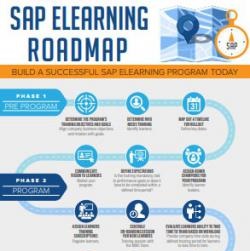Grow your SAP knowledge with Social Learning
by Amy ODonnell
 If you’ve ever found yourself saying something differently, with a new habit you didn’t intend to have, or said to someone that another person is “rubbing off” on you, you’ll understand the term social learning.
If you’ve ever found yourself saying something differently, with a new habit you didn’t intend to have, or said to someone that another person is “rubbing off” on you, you’ll understand the term social learning.
It’s certainly not a new idea, and comes in many forms. It’s the premier chef whose mother or grandmother first taught them to cook, or the auto mechanic who learned about motors from their father, sibling or cousin. Anyone who has ever learned a skill, a habit, or anything else from another person by spending time and watching another person and emulating them has experienced the basics of social learning.
Social Learning Defined
It’s a combination of cognitive learning and behavioral learning when people learn from others by observing, modeling and imitating. Social learning, even in the context of a formal learning curriculum, is a more informal side of furthering skills and education and has been in practice for hundreds of years.
Popularized by psychologist Albert Bandura, the concept of social learning includes four criteria for learning:
- Observation, the environmental aspect
- Retention, the cognitive aspect
- Reproduction, also a cognitive aspect
- Motivation, involving both
Children learn from their parents, siblings, and others around them, including basics like language skills. Adults learn from others later in the same fashion. Hands-on skills like welding and plumbing are taught both academically and by social learning.
A study on social learning by the University of Michigan found that:
- 23% of students believe that it helps them learn from others
- 16% of students felt like it made learning fun
- 10% of students believed it helped them to be more engaged
Clearly, social learning can have an impact on anyone who is studying something new.
Social Learning In An Online Environment
Different people learn in different ways. Some learn by reading, some by listening, and some by rolling up their sleeves and doing. But when the “classroom environment” is available at the click of a button, getting together with others in different time zones becomes a challenge.
Before online learning, instructors and professors held “office hours” to meet with students individually. Students were able to go to a study hall to collaborate with others to better understand a difficult subject. Online learning and collaboration have opened up a range of possibilities with Skype and Zoom conferences, as well as platforms like Slack, Basecamp, and others. These tools enable students to collaborate with whomever they want despite the geographic distances.
Social learning isn’t the same as social media, but social media can play a part in overall learning. Facebook abounds with private groups dedicated to a wide range of specific topics (such as SAP for beginners, for example). These groups are either self-started by individuals interested in learning more, or by a company-led learning program to discuss a specific subject. Some may be a general group for everyone, while others may be for specific courses, such as Basic SAP or SAP Fiori. Some e-learning platforms may have other places to collaborate, such as Groupsite.
Making Social Learning Work For You
Learning today is more than just a lecture, it’s a collaborative experience. However, it doesn’t take the place of good study habits. So how do you make the most of social learning?
- Participate in Cohort-Based Training. Sometimes it just takes a short conversation with a fellow student to help you on the right path or keep going. If the e-learning platform already has a collaborative environment set up for you to use, from a private Facebook group to an Intranet-based platform, working with your fellow students is a faster way to learn and master the subject matter.
a. You can create your own sub-group with just a few students if you feel more comfortable with a smaller group or have a specific need. Use this sub-group to support each other, share ideas, and ask for help when you need it. This helps everyone learn, and it’s important to participate. Available technology means you can meet anytime, anywhere regardless of location, and the set time (i.e., weekly) means you make a commitment to learning as well as to others in your group. The fellow students that you select for your group are sub-group are there for the same reasons you are—to learn and understand better. You’ll also build your teamwork skills in the process.
b. If you don’t have that capability for a sub-group of cohorts, create one. Work with a few students that you want to work with individually, on a set schedule.
- Peer Reviews. Common in many circles and professions, a peer review involves submitting your assignment to the group for an objective review before turning it in. No criticizing—members just offer suggestions or correct any errors in a safe environment. From proofreading to substantive errors, it helps to have one or more people review an assignment before turning it in.
- Work with an accountability partner. Use peer pressure to your advantage. Working with someone one-on-one is one way to not only learn better but stay on track. Find someone who wants to learn more and understand the parts of the material that you are having trouble with, and identify your goals. Have a set time for catching up, and meet up when one of you needs help. Working alone is one thing, but knowing that there is someone else relying on you to keep your end of the agreement is a bigger motivator. If you’re part of a larger group, you can find a partner to work with, or the group can assign partners.
- Make it a game. “Gamifiying” learning can be an enjoyable motivator in a group. It’s not about pitting one against the other, but creating a contest environment that intrinsically motivates everyone to learn, create, do better, or whatever the end means is. Share, post, and reward the activity. Each individual will gain a positive feeling of accomplishment, as well as a better understanding. If done correctly, everyone ultimately wins, because they learn something they needed.
- Use social media to follow people who talk about it. It’s more than just keeping up with your friends. Just like companies that advertise products and services all over social media, you can learn more about a subject by following someone who talks about it. These can include SAP blogs and wikis that are created by employees of a company or others who discuss the subject regularly.
However, you get started with social learning, sharing and posting helps everyone benefit from disseminating the information, as well as fostering discussion. Rewarding participants will help continue participation and facilitate learning.
Starting on a new learning path, such a learning SAP can be exciting and overwhelming at the same time. Social learning can help ease the transition and fast-track your learning while working with others who are interested in the same thing.
Start Your SAP Career Path
We’ve helped more than 300,000 people find their new career in SAP. Could a new career in SAP be right for you? You’ll never know until you ask. Contact us today to find out how you can learn SAP and be on your way to a new career in IT.
by Amy ODonnell
More Blogs by Amy ODonnell

The Job Seekers Guide to Learning SAP
For most people, SAP job hunting is right up there with a root canal. ...

10 Ideas For Recognizing And Rewarding Learners
Motivated students and engaged employees are always an asset to any or...

Related Blogs

5 Ways How Technology Affects The Learning Industry
Technological disruption is affecting nearly every industry right now,...

Roadmap to Successful SAP Training
Yes, it is that busy season again… with everything from year-en...

6 Ways to Engage your Millennial Team Members
As I was driving towards San Francisco last weekend, I saw a Prudential...
.png)

